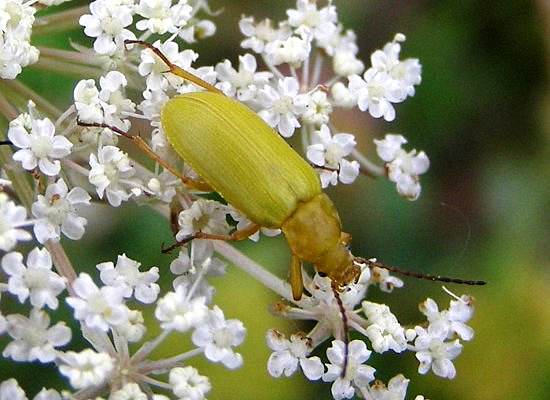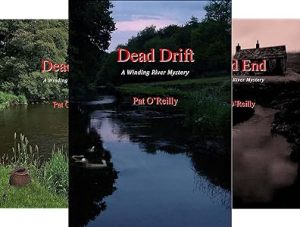Cteniopus sulphureus - Sulphur Beetle
Phylum: Arthropoda - Class: Insecta - Order: Coleoptera - Family: Tenebrionidae

The distinctive sulphur beetle is bright yellow and in the UK it cannot be confused with any other species, because no other beetles found here are such a bright yellow colour. The adults live in flowers, and particularly members of the family Apiaceae (the carrot family), where they feed on pollen and nectar.
The sulphur beetle is a member of the sub-family Alleculidae, the comb-clawed beetles, within the family Tenebrionidae, which are known as the darkling beetles (hardly appropriate for such a brightly coloured insect, but there it is!)
Sulphur beetles are found almost exclusively in dry places such as sand dunes or chalk downland.
Throughout most of the British Isles this is therefore a coastal species.
The specimen shown here, on flowers of wild carot, was photographed at Kenfig National Nature Reserve towards the end of July, a time when many other beetles including the soldier beetle (Cantharis livida) are usually in evidence.
References
O'Reilly, Pat. (1997; 8th reprint 2010) Matching the Hatch. Shrewsbury: Quiller Publishing.
Foster G. N. & Friday L. E. (1988) Key to adults of the water beetles of Britain and Ireland (Part 1). Taunton: Field Studies Council.
Harde K.W. & Severa F. (1984) Field Guide in Colour to Beetles. Littlehampton Book Services.
Excited at the prospect of flyfishing? So are we, and we're pretty sure you would find the Winding River Mystery trilogy of action-packed thrillers gripping reading too. Dead Drift, Dead Cert, and Dead End are Pat O'Reilly's latest river-and-flyfishing based novels, and now they are available in ebook format. Full details on our website here...
Buy each book for just £4.96 on Amazon...
Please Help Us: If you have found this information interesting and useful, please consider helping to keep First Nature online by making a small donation towards the web hosting and internet costs.
Any donations over and above the essential running costs will help support the conservation work of Plantlife, the Rivers Trust and charitable botanic gardens - as do author royalties and publisher proceeds from books by Pat and Sue.
